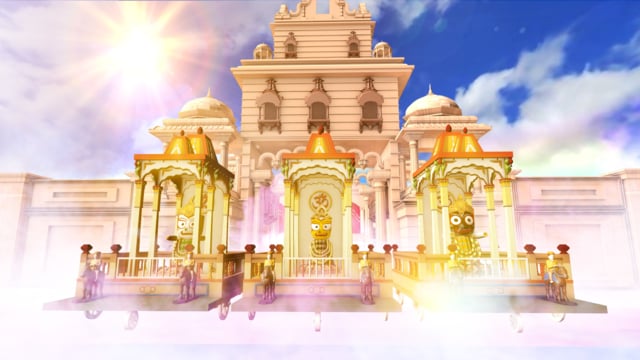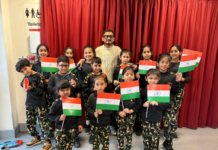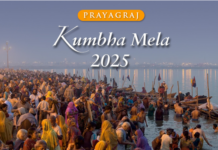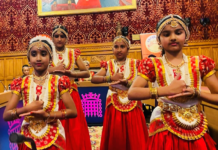United Hindu Cooperatio: By Stephen Knapp
(Sri Nandanandana dasa)
(Written for the 2nd World Hindu Congress in Chicago, September 7-9, 2018, for the souvenir magazine)
As we look at Hindus today, we have so many organizations that work for the sake of the Dharma traditions. We have such institutions as the RSS, HSS, VHP, HSC, HMEC, Kalyana Ashrama, or Swadhyaya, Iskcon, Gaudiya Math, the World Vaishnava Association, RamaKrishna Mission, Chinmayananda Mission, Vedanta Society, Self-Realization Fellowship, and many others. And I am happy to say that I have worked with many of them or still have friends in them. But some of these groups seem to be more exclusive than others. They may work hard for their own interests, yet these are often similar to the work and goals of other institutions. So, what if we were more united, more cooperative with each other? We know that there is strength in numbers. So how much stronger could we be if we could cooperate in a single force, at least when needed?
It seems that right now we cannot easily unite and become a strong federation, a powerful force that can determine the fate or future of India and the preservation of its Vedic culture. If anything, so many of these associations in India still fight with or are indifferent to one another and, thus, weaken each other to the point of becoming incapable of performing any worthwhile actions that will make a real difference for the unity and future of India and its traditions. More divisions mean more disunity. This means the less unity we will have for defending our culture.
This was the same sort of weakness of the past 1000 years when invaders came into India, sometimes few in numbers, but conquered and took over parts of the country without much resistance. It was this lack of unity amongst the princely states, and their inability to support each other or come to the aid of another, that allowed for such a poor defense system in which they could not repel their invaders. So, we have to ask ourselves, are we going to continue the same pattern? Are we going to sit back and criticize others and what they have or have not done while we have yet to do anything of real significance? If we do, then there is no doubt that we, Hindus in general, are already finished. It is only a matter of time when we and the Vedic system will become so diminished that it will fade from the world, like other cultures that have been reduced to mere museum pieces. We have to rise above that.
So, it seems we still do not have a unified identity in which we can all work together. I was the president of the Vedic Friends Association for 15 years in which we are still trying to create such a united force here in America. Nonetheless, in my view, one of the greatest attempts to do this in India was the Acharya Sabha as organized by Swami Dayananda Sarasvati, which joined together over 200 spiritual leaders of the major paramparas and spiritual lineages to discuss the common issues that affected all of them, and then make plans on how to deal with such concerns.
So, in this regard we need to reach a singleness of purpose in which we feel that if any part of the Vedic tradition or any group is under attack or being challenged by outside forces, then we are all under attack, and we all must be ready to stand up for the cause. We should be willing to be a united force to be reckoned with, the kind that makes people think twice before persecuting or attacking any Hindus or any part of the Vedic tradition. But this is a call to be active. And many Hindus are not.
Once while giving a talk at a Krishna temple in Mumbai, I began discussing the need to be protective of our culture and try to elect those politicians who are pro-Hindu, or show why they should be pro-Hindu. So, I asked the audience of over 1200 people how many had participated in the last election. Not one hand went up. This is why some people ask whether Hinduism is destined to become extinct. I hope not, but that depends on what we do. Which means we all have to be pro-active.
If we were a stronger and unified force, politicians would know that they need to get our approval. They would take the needs of Hindus more seriously if they want our vote. They would not simply be concerned with vote bank politics that often cater to non-Hindus. Such strength would also mean there would not be the persecution of Hindus that often seems to be sanctioned by politicians in states such as Kerala or West Bengal, or love jihad as found in Tamil Nadu and elsewhere. They would know that Hindus will react and defend themselves, or even go after the politicians who neglect them or even work against them.
Some say that Sanatana-dharma means that it is eternal, so there is no need to worry. But that means they do not even know that Lord Krishna said in Bhagavad-gita (4.1-3, 7-8) that one of His purposes was to re-establish the Vedic traditions that had become lost. This lack of familiarity is a sign of such fading away of knowledge of the Dharmic culture, and the importance of understanding the part we need to play. Arjuna also had to fight for Dharma, so why should we not think that we also need to do something to protect Vedic Dharma?
India must remain the homeland of a thriving and dynamic Vedic tradition. This is essentially based on the universal spiritual truths and knowledge that can be applied by any person at anytime, anywhere in the universe, so they can reach their highest potentials. That is Sanatana-Dharma. If Hindus, Dharmists or Sanatanis, whatever name you want to use, can stand united, there is no threat we cannot handle. History has shown that. But history has also shown that when we are fragmented, then bits and pieces of our culture and even our Mother India get chopped off and taken away from us. This cannot go on.
Therefore, the need of the hour is to find the means wherein we can stand together for the cause of Sanatana-Dharma, the basis of our Hindu culture.
If we can do this, the youth would also be more proud of being a part of something in which reasoning is sound, stable, and in which the participants, such as their parents, are not shy about sharing it or defending it. Nonetheless, the children have to be guided by proper training and association, and proper observance of Vedic traditions. This also is part of forming the proper samskaras in the minds of the children. And isn’t this what we are meant to do anyway? But for this to happen, the parents must also be educated in our Dharmic traditions.
We also need to realize that America is a prime location where we can work together for cultivating as well as protecting and preserving the Vedic tradition. Why? Because there is less emphasis amongst Indian Hindus on local ethnicity or caste. In other words, it is easier to simply be an Indian Hindu or American Hindu rather than a Rajasthani Hindu, Maharashtrian Hindu, or Tamil brahmin, and so on, which thereafter can bring out so many distinctions. If we are going to become united, our identity should first start with being a Hindu, Dharmist or Sanatani: a follower of Sanatana-Dharma. Anything else can be added after that, no matter whether we are Indian, Nepali, Malaysian, Fijian, or from Mauritius, Bali, or America. We are first Hindus or Dharmists. In order to create greater cooperation and a powerful association, we need to have and accept a more unified identity. Then in that light, we can work together and assist each other for the Vedic cause, and form a united federation that can more powerfully take on any threats to our future. There is no reason why we cannot do that if we actually live by the spiritual principles of Sanatana-Dharma, and, thus, Think Collectively, Act Valiantly.
Author of over 40 books on different aspects of the Vedic tradition, including “Crimes Against India: And the Need to Protect its Vedic Traditions—1000 Years of Attacks Against Hinduism and What to do About It.” (www.stephen-knapp.info)

—
Readers like you, make ESHADOOT work possible. We need your support to deliver quality and positive news about India and Indian diaspora - and to keep it open for everyone. Your support is essential to continue our efforts. Every contribution, however big or small, is so valuable for our future.











